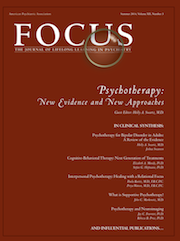Psychotherapy has been a central part of psychiatric treatment from its inception. Indeed, in the early part of the 20th century, psychoanalytic psychotherapy was a defining part of many psychiatrists’ work. With the ascendance of pharmacotherapy in the second part of the last century, however, our models of mental health increasingly shifted from psychological and interpersonal wellness to “correcting chemical imbalances.” Many feared the demise of psychotherapy.
In the last three decades, psychotherapy, rather than going the way of the dinosaur, has enjoyed a resurgence. As we have seen in several large, multisite studies such as STEP-BD, STAR*D, and CATIE, pharmacotherapy too often falls short of bringing about full and lasting remission for patients. And, even when medications contribute to the remission of symptoms, psychosocial impairment frequently persists. Psychotherapies, now subject to the same rigorous testing as pharmacotherapy in randomized controlled trials, have increasingly demonstrated efficacy both alone and in combination with pharmacotherapy for many common psychiatric disorders. Rather than discarding psychotherapy from our armamentarium, psychiatrists are increasingly encouraged by evidence-based guidelines to include these treatments in our algorithms for optimal care.
The current issue of FOCUS explores the field of psychotherapy in the 21st century—where we are now and where we are headed. Experts in psychotherapy provide updates in evidence-based psychotherapy modalities including Cognitive Behavioral Therapy (CBT), Interpersonal Psychotherapy, and Supportive Psychotherapy. Recognizing the growing importance of technology in mental health, an expert in Internet psychotherapy advises us on the safe and effective delivery of Internet CBT. A colleague and I discuss the role of psychotherapy in a very “biologic” disorder (bipolar disorder). Investigators with expertise in neuroimaging examine the relationship between psychotherapy and neurocircuitry, presaging a time when we will have neural biomarkers available to help us determine which treatments—including psychotherapy—work for whom. Finally, an ethicist reminds us of the importance of understanding and upholding professional boundaries in the context of the psychotherapeutic relationship.
I am grateful to the experts who have shared their wisdom to create this exciting issue of FOCUS. Thanks to their collective knowledge and vision, I am confident that you will have a renewed appreciation for the vital role that psychotherapy plays in the management of psychiatric illness—both today and in the future.

